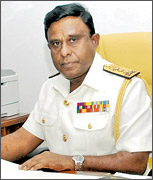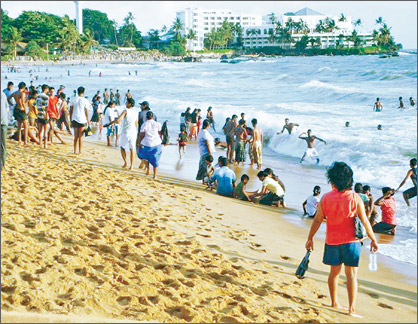Making Lanka a maritime hub of S. Asia
By Dhaneshi YATAWARA
|

Coast Guards DG Rear Admiral Daya Dharmapriya
|
Sri Lanka possesses a sea area 21 times bigger than its land area
with territorial waters of 21,770 square kilometres. While the maritime
economic zone is 465,800 square kilometres. Sri Lanka is located in a
unique geographical centre of shipping routes and nautical traffic. Its
central location make the waters in its vicinity a hub of illegal
maritime activities as well. The post-conflict peace has created an
environment conducive to develop maritime activities.
"With maritime activities in ascendency more people are attracted to
the sea and more vessels to our harbours for trade. Consequently safety
and security becomes a serious concern and there should be policemen to
control the sea traffic," said Sri Lanka Coast Guards Director General
Rear Admiral Daya Dharmapriya explaining the heavy load of
responsibilities the Sri Lanka Coast Guards will shoulder in the future.
It will be the task of the Sri Lanka Coast Guards to maintain law and
order in our territorial waters. The Coast Guard Act No. 41 of 2009
enacted by the Parliament on a Cabinet paper presented by President
Mahinda Rajapaksa incorporated the Department of Coast Guards. The
department will assist in counter smuggling operations, illegal fishing,
identify piracy, and curb human trafficking. "We have called upon the UN
to grant us the right to expand Sri Lanka's maritime boundaries by
20-fold with much hope", said President Mahinda Rajapaksa at the launch
of the Sri Lanka Coast Guards at the Galle Harbour. Being an island
nation sea is our biggest asset and at present moves are afoot to
explore underwater resources.
"The sea bed is rich in a variety of natural resources and Sri Lanka,
in the future, needs to explore its potential. So keeping this safe,
secure and pollution-free is very important," Rear Admiral Dharmapriya
said.
Sri Lanka Coast Guards
|

Mount Lavinia beach on a busy day |
Sri Lanka Coast Guards is a non-military law enforcement agency at
sea and the officers are designated as Peace Officers. They are
empowered with legal authority to search and arrest ships, crafts and
persons engaged in illegal activities in maritime zones and territorial
waters. Human trafficking issues have been particularly straining Sri
Lanka's relations with countries such as Italy, Indonesia, and Australia
as migrants attempt to enter their soil illegally. The Coast Guard will
have the ability to stop, check, search, arrest, and prosecute
individuals engaging in illegal activities within the Sri Lankan
nautical boundaries.
In addition to its responsibility of nabbing illegal pursuits, the
Coast Guard will respond to calls on lost ships by conducting search and
rescue operations.
Sri Lanka's area for such enterprises is 10 times the size of the
country. Before the Coast Guards were established there were number of
instances on human smuggling in Sri Lankan waters. Once a vessel
smuggling people from Cox's bazzar in Bangladesh to Australia was
abandoned in our waters due to engine trouble. "Initially it was
suspected to be a LTTE ship during the height of the war. Following
close surveillance 21 people were found being illegally transported to
Australia. By then 12 had died and corpses were thrown over board," Rear
Admiral Dharmapriya said. Although the Sri Lanka Navy had to be deployed
it could not take legal action against such illegal activities. Coast
Guards have been empowered to ensure the security, safety and
cleanliness of the maritime environment by limiting pollution and
dealing with environmental crises such as oil spills.
Oil spill risks
In 2006 a ship sailing in our waters experienced an oil leak causing
damage to the marine fauna and flora. "We had to seek assistance from
the Indian Coast Guards to clear the polluted environment," Rear Admiral
Dharmapriya said. This year another ship carrying sulphuric acid, named
Granma, coming from Tuticorin in India broke down in the seas off
Trincomalee and the sulphuric acid started leaking into the sea.
"The ship tried to sail into Trincomalee harbour but due to the
hazardous state of the ship we instructed the ship authorities to take
the ship away from Sri Lankan shores. We managed to move the ship to
deep sea.
Later the ship sank," the Director General said. "When such accidents
happen, the Coast Guards will be the lawful authority in any country to
take action as we have to deal with civilians, not the military
personnel," he explained.
Sri Lanka did not have a proper Coast Guard Department earlier.
President Mahinda Rajapaksa as the then Minister of Fisheries
established the Fisheries Coast Guards which was not a full fledged body
with legal authority.
Its main focus was protecting the fishermen. The Coast Guards
Department was also set up on a concept of President Mahinda Rajapaksa.
According to the Director General of Coast Guards today Sri Lanka has
about 22,000 fishing boats and trawlers and another 8,000 multi-day
fishing trawlers.
"Maritime traffic is at the highest in Dondra Point and a special
traffic separation zone was established many years ago. Just like the
Traffic Police the Coast Guards control maritime traffic," he added.
According to the Traffic Separation Zone rules, ships travelling towards
the west from Dondra should sail eight nautical miles away from the land
and ships to east, 12 nautical miles.
With the development of the harbours in Colombo south, Galle,
Hambanthota and Oluvil the maritime traffic will be heavier.
Pollution free
"Sea is not a place to dump garbage. It need to be protected," Rear
Admiral Dharmapriya emphasised.
"The sea being an asset to us there are number of future potentials
such as research on oceanography, setting up offshore airports and
factories etc. With the growth of the industrial sector in Sri Lanka
maritime industries too will increased. "Even Norochcholai power plant
has a share in maritime industry as the coal will be brought by sea and
transferred to the power generating plant.
Sri Lanka Coast Guards is in its infancy. "We have a five year plan
to develop our force into a full fledged Coast Guard unit," Rear Admiral
Dharmapriya said. The bilateral relations with foreign counterparts are
important. Our immediate neighbour India has one of the world's best
Coast Guards. Established in 1978 and today the Indian Coast Guards have
a large number of ships, vessels, hovercrafts and all equipment.
The recent visit of the Indian Coast Guards led by Inspector General
V.S.R. Murthy, is very important in strengthening bilateral ties. Murthy
visited the Coast Guard units at Colombo and Mirissa and the other
strategic locations the Coast Guards will be established in the
immediate future.
A new life saving unit has been set up at the Galle Face beach by the
Department of Coast Guards which intends to launch life saving units
around the island in the future. The first life saving unit was
established in Mirissa in Matara.The Mahinda Chinthana - the vision for
tomorrow envisages the development of maritime activities and the
efficient management of all maritime resources.
The Sri Lanka Coast Guards are called upon to play a significant role
in restoring the past glory of the country making it the maritime hub of
South Asia. |

